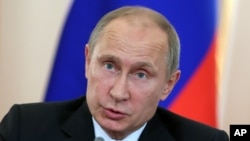Russian President Vladimir Putin says he does not rule out supporting a U.N. authorization of military force against Syria if there is proof government forces used chemical weapons against civilians.
He told the Associated Press and Russian television that the United States should present "convincing" evidence to the U.N., and warned the U.S. against taking military action without U.N. approval.
Putin also said Russia has suspended the delivery of S-300 surface-to-air missile components to Syria, but would reconsider if steps are taken that "violate international norms."
Russia is hosting the G20 summit later this week in St. Petersburg, where Syria is expected to be high on the agenda.
U.S. President Barack Obama has been seeking domestic and intenational support for taking action against Syria. He is stopping in Stockholm for a one-day visit before flying on to Russia.
Photo Gallery: Latest Images from Syria
Senate vote
Meanwhile, a key U.S. Senate committee could vote as early as Wednesday on a measure authorizing U.S. military force. Leaders of the Foreign Relations Committee agreed late Tuesday on details of the plan that would give Obama authority to order limited strikes against Syrian military targets for 60 days. He could extend the window by another 30 days under certain conditions. The resolution would not authorize the use of ground troops.
It states military action must be aimed at deterring and preventing Syria from carrying out future chemical weapons attacks. The measure would also require Obama to present a strategy for bringing a political resolution to the Syrian crisis.
The resolution must clear the committee and gain approval in the full Senate and House of Representatives before taking effect.
France also says it has evidence Syrian forces were responsible for the deadly attack near Damascus last month. The country's parliament is debating a possible military response in a session Wednesday, though French President Francois Hollande does not need lawmakers' approval to act.
Syria has denied using chemical weapons, alleging it was the rebels who deployed them.
Congressional leaders support Obama plan
Tuesday in Washington, John Boehner and Nancy Pelosi, the Republican and Democratic leaders in the House, expressed their support for President Obama's plan. Others in Congress remain leery of approving military force.
Secretary of State John Kerry told the Foreign Relations Committee he has no doubt that U.S. inaction on Syria would lead to a greater war and more use of chemical weapons.
He said it is beyond any reasonable doubt that President Bashar al-Assad's government used chemical weapons on civilians in the attack last month that killed more than 1,400 people near Damascus.
Kerry and Defense Secretary Chuck Hagel are due to appear Wednesday before the House Foreign Affairs Committee to discuss Syria.
He told the Associated Press and Russian television that the United States should present "convincing" evidence to the U.N., and warned the U.S. against taking military action without U.N. approval.
Putin also said Russia has suspended the delivery of S-300 surface-to-air missile components to Syria, but would reconsider if steps are taken that "violate international norms."
Russia is hosting the G20 summit later this week in St. Petersburg, where Syria is expected to be high on the agenda.
U.S. President Barack Obama has been seeking domestic and intenational support for taking action against Syria. He is stopping in Stockholm for a one-day visit before flying on to Russia.
Photo Gallery: Latest Images from Syria
Senate vote
Meanwhile, a key U.S. Senate committee could vote as early as Wednesday on a measure authorizing U.S. military force. Leaders of the Foreign Relations Committee agreed late Tuesday on details of the plan that would give Obama authority to order limited strikes against Syrian military targets for 60 days. He could extend the window by another 30 days under certain conditions. The resolution would not authorize the use of ground troops.
It states military action must be aimed at deterring and preventing Syria from carrying out future chemical weapons attacks. The measure would also require Obama to present a strategy for bringing a political resolution to the Syrian crisis.
The resolution must clear the committee and gain approval in the full Senate and House of Representatives before taking effect.
France also says it has evidence Syrian forces were responsible for the deadly attack near Damascus last month. The country's parliament is debating a possible military response in a session Wednesday, though French President Francois Hollande does not need lawmakers' approval to act.
Syria has denied using chemical weapons, alleging it was the rebels who deployed them.
Congressional leaders support Obama plan
Tuesday in Washington, John Boehner and Nancy Pelosi, the Republican and Democratic leaders in the House, expressed their support for President Obama's plan. Others in Congress remain leery of approving military force.
Secretary of State John Kerry told the Foreign Relations Committee he has no doubt that U.S. inaction on Syria would lead to a greater war and more use of chemical weapons.
He said it is beyond any reasonable doubt that President Bashar al-Assad's government used chemical weapons on civilians in the attack last month that killed more than 1,400 people near Damascus.
Kerry and Defense Secretary Chuck Hagel are due to appear Wednesday before the House Foreign Affairs Committee to discuss Syria.







